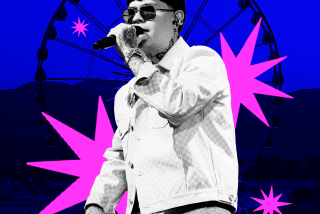Stalwart Sax Man Jr. Walker Still Pours Out That Gutbucket Sound
- Share via
Unlike many of his Motown contemporaries, sax man Jr. Walker has never stopped making music full time. Since he first scored big on the pop charts with “Shotgun” in 1965, his irrepressible brand of honking party music and gutbucket rhythm has been stirring up dance floors nationwide.
His fortunes have ebbed and flowed; sometimes there’s been a record company behind him and sometimes there hasn’t. He’s worked with his own All Stars and with other bands such as Foreigner (looking for something to make their recording of “Urgent” sultry, the British hard rockers called upon Walker to add a bleating sax part).
But even when (like now) his music hasn’t been happening on the radio, people have wanted to hear him play. And that’s always been the payoff for him. He’ll be at the Coach House in San Juan Capistrano on Saturday night.
“Keeping different bands together isn’t always easy,” he admitted a few days ago on the phone from San Francisco where he’d just finished a concert with Stevie Ray Vaughan and Tower of Power. “But I love to be out amongst the people, to be out there playing for them. So, somehow, we always manage to keep things together.”
Walker, born Autry Dewalt, became interested in the saxophone when he first heard “Yakety Sax” by Boots Randolph. He had been spending most of his time working on race cars, but there was something about “that crooked horn” that intrigued the young man.
Growing up in South Bend, Ind., he would watch neighborhood jam sessions and practice on his big brother’s horn--until the day his mother told him to pick out “a good one.” She began making payments on the instrument that Jr. Walker would end up blowing all his hits through.
These days, it seems hard to imagine Walker as anything less than a stalwart on the party music circuit. After winning a Grammy and scoring such hits as “Road Runner,” “Shake and Fingerpop” and “Do the Boomerang,” it doesn’t seem like there’s much left for Walker to accomplish.
“I don’t know about that,” he responded quickly, heading off any notion that he’s ready to rest on his laurels. “I just finished making a movie with Sam Moore of Sam and Dave called ‘Tape Heads.’ It’s coming out in March, and I play guitar and sing.
“I’ve been doing some recording, too. We’re getting ready to start talking to some record companies, but it’s too early yet to tell.”
If Walker does get picked up by a label, it wouldn’t be the first time his career has been kicked back into higher gear. After leaving Motown at the end of the ‘60s, Walker found himself back on its roster when the disco craze embraced the very sort of wailing, sax-propelled, good-time music he was known for.
Walker’s music has always come from the dance floor. “I was playing at the El Grotto in Battle Creek, Mich., and I remember there was this dance the kids were doing. There was this guy doing a karate dance, and nobody could get up on him. So instead, they started doin’ this dance and jumping around like they were shooting some kind of shotgun, so they could, like, cut him down.
“Well after that, the kids came up to me and said that they needed a song for the dance. So, that’s how I ended up doing ‘Shotgun.’ ”
His first hit, “Shotgun” well may have saved Walker from being poured into the Motown mold. Label owner Berry Gordy Jr. was busy overseeing every aspect of his other acts, from their calculatedly pop songs to their charm/finishing schools.
But “Berry just kept me separate and let me play my music with my band,” Walker recalled. “I think a lot of that Motown sound stemmed from James Jameson, who played bass with the Motown Band. That band had a lot to do with the way those old Motown records sound. But the way they played their music, it didn’t fit what I was doing, so they let me keep my own sound. I think they just figured it was easier that way.”
In any case, Walker’s “own sound” has proven its durability. “The audience doesn’t really change,” he noted. “The younger kids may have grown up, but they’re still coming, and the younger crowd seems to have come in, too. They all seem to really like the music.”
Part of Walker’s secret for bridging the musical generation gap: He keeps the music as live as possible. Cutting three or four songs in two hours is not unusual for him, which explains why so many of his records have the same feel as the songs do live on the dance floor.
“It doesn’t take long to do a song,” he said with a laugh. “When we cut ‘Urgent,’ I blowed it and then they said, ‘Could you blow it with a few more high notes. . . ?’ And that’s what I did. It was the same way with ‘Shotgun.’ We only played it twice, and the take they used was the first one!”
Jr . Walker and the All Stars play the Coach House, 33157 Camino Capistrano, San Juan Capistrano, at 9 p.m. Saturday. Admission: $17.50. Information: (714) 496-8930.
More to Read
The biggest entertainment stories
Get our big stories about Hollywood, film, television, music, arts, culture and more right in your inbox as soon as they publish.
You may occasionally receive promotional content from the Los Angeles Times.










